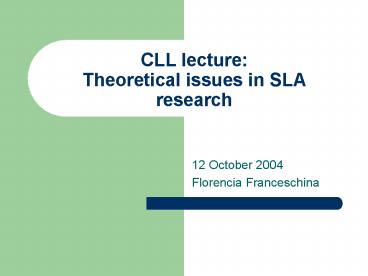CLL lecture: Theoretical issues in SLA research - PowerPoint PPT Presentation
1 / 18
Title:
CLL lecture: Theoretical issues in SLA research
Description:
CLL lecture: Theoretical issues in SLA research 12 October 2004 Florencia Franceschina Learnability Q1: How is it possible for humans (but not animals or machines) to ... – PowerPoint PPT presentation
Number of Views:181
Avg rating:3.0/5.0
Title: CLL lecture: Theoretical issues in SLA research
1
CLL lecture Theoretical issues in SLA research
- 12 October 2004
- Florencia Franceschina
2
Learnability
- Q1 How is it possible for humans (but not
animals or machines) to learn to understand and
produce sentences of the language(s) they are
exposed to?
3
Approaches to Q1
- Interactionist/sociocultural modelse.g.,
Schumanns (1978) Acculturation/Pidginization
Hypothesis - Cognitive modelse.g., Bates and MacWhinneys
(1985, 1989) Competition Model - UG-based modelse.g., White (1989, 2003), Flynn
et al. (1998), Schwartz (1998), Archibald (2000),
Herschensson (2000), Balcom (2001), Hawkins (2001)
4
Evidence for UG in FLA
- FLA is
- Quick
- Effortless
- Uniform across stages of acquisition
- Robust in terms of noisy/variable input
- It shows equipotentiality across learners
5
Evidence for UG in FLA
- Poverty of the Stimulus (PoS) our linguistic
knowledge is underdetermined by the input - Example 1 Structure Dependence Principle
- Example 2 OPC
6
Structure Dependence Principle
- This is my cat Is this my cat?
- Paws has drunk his milk Has Paws drunk his
milk? - My cat is the best Cat my is the best?
7
Overt Pronoun Constraint
- (1) John believes that he is intelligent
?English ? Japanese - (2) John believes that _ is intelligent ?
English ?Japanese - Montalbetti (1984)
- Kanno (1997)
8
Overt Pronoun Constraint
- Japanese
- (1) Johni believes that hei/j is intelligent
- (2) Johni believes that _i/j is intelligent
- (3) Everyonei believes that theyj are
intelligent ? OPC - (4) Everyonei believes that _i/j are intelligent
9
UG, principles and parameters
- The aspects of I-language which are common to
all of us are known as UG, and the theory of UG
will state the commonalities that hold across all
possible languages (often called principles of
UG) and in what ways individual I-languages may
diverge from these commonalities (known as
parameters of variation of UG or just
parameters). - Adger (2003 16)
10
Evidence for UG in SLA?
- Target-like outcomes are the norm in FLA
- Vs.
- Non-target-like outcomes are typical in SLA
11
Accounts of divergent outcomes
- Account 1 No access to UG
- Clahsen and Muysken (1986)
- Schachter (1988)
- Fundamental Difference Hypothesis (Bley-Vroman,
1990)
12
Accounts of divergent outcomes
- Account 2 Full access to UG
- Flynn (1987)
- Epstein, Flynn and Martohardjono (1996)
- Scharwtz and Sprouse (1996)
13
Accounts of divergent outcomes
- Account 3 Partial access to UG
- Smith and Tsimpli (1995)
14
Accounts of divergent outcomes
- More recent proposals
- Account 2 Missing Surface Inflection
Hypothesis (MSIH, Prevost and White, 2001) - Account 3 Failed Functional Features
Hypothesis (FFFH, Hawkins and Chan, 1997)
15
A case study Patty
- Consider the case of Patty (Lardiere, 1998a, b)
- Which of the two recent accounts is supported by
the data? - What other information about Pattys L2 knowledge
would be useful to help us reach a definite
conclusion?
16
The initial state
- Account 1 Full Transfer/Full Access (FT/FA,
Schwartz and Sprouse, 1994, 1996) - Account 2 Minimal Trees (Vainikka and
Young-Scholten, 1994, 1996)
17
Reading
- Mitchell, R. and F. Myles 1998 Second language
learning theories. London Arnold. - Hawkins, R. 2001 Second language syntax. A
generative introduction. Oxford Blackwell.
(Chapter 8) - White, L. 2003 Second language acquisition and
Universal Grammar. (2nd edition) Cambridge CUP.
(Chapter 2)
18
From theory to data
- Exercise































